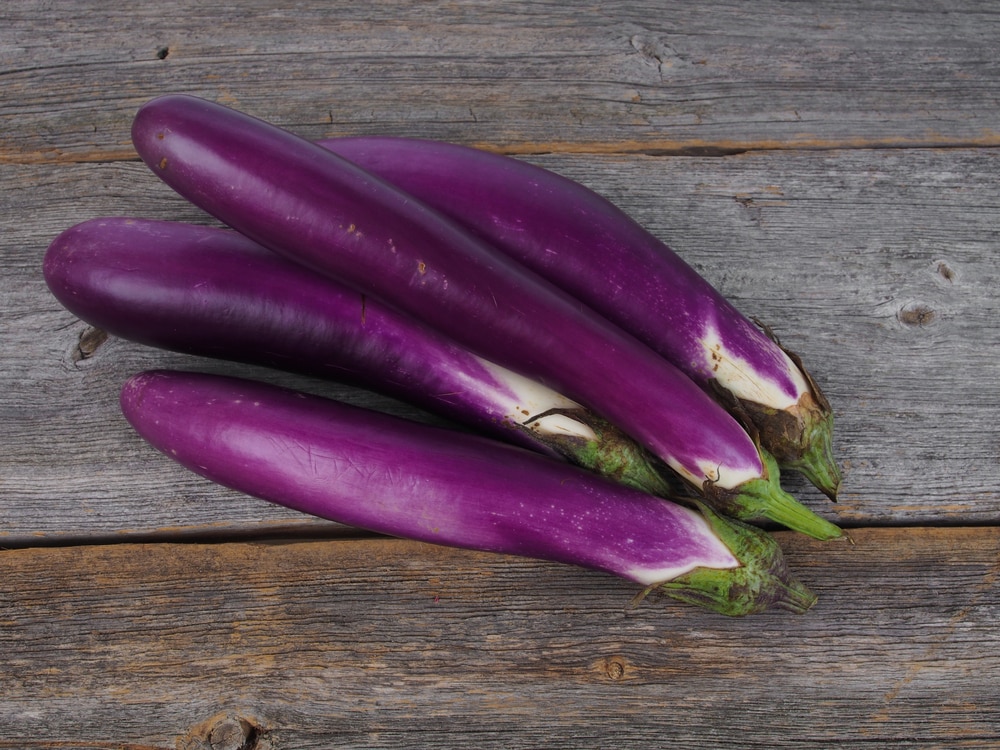
Eggplants are one of the most commonly available vegetables. The eggplants are known for their sponge-like texture while their tiny seeds have a bitter flavor. In addition, eggplants are extremely versatile and are available in different types. So, if you are gaining more information about eggplants, we are talking about Chinese eggplant vs regular eggplant in this post!
Chinese Eggplant vs Regular Eggplant
Regular Eggplant
The regular eggplants are the ones that we purchase from the common grocery stores. These are often labeled as the standard globe eggplants, American eggplants, and western eggplants. The regular eggplants are the most affordable and the biggest and are easy to find in the grocery stores. It wouldn’t be wrong to say that regular eggplants are the fattest ones with an oblong shape – it’s more of a teardrop shape.
When it comes down to the appearance of regular eggplants, they are usually darker in color; the color is purple. As for the length, the regular eggplants have a length of 15cm to 25cm. However, the seed content is quite high in these eggplants. In fact, the higher percentage of seeds leads to a bitterer flavor because the number of seeds and bitter flavor is directly proportional. For this reason, regular eggplants tend to have less flavor.
When it comes down to the application, regular eggplants have a meaty flesh and texture, which means you can chop it to make roasted and grilled eggplants (it can also be sliced). Also, the chopped eggplants are suitable for adding to dips, ratatouille, and stews. In addition to this, regular eggplants have a meaty and tough texture as compared to other varieties. These eggplants are perfect for making eggplant parm and some people also use them as bread substitutes.
Since it has a sponge-like texture, you need to be careful while frying in the oil because you’ve to ensure it doesn’t absorb too much oil. So, if you have to fry the eggplant, it’s better to coat them in flour to prevent greasing. All in all, it can be grilled whole (yes, just like potatoes).
Chinese Eggplant
Chinese eggplant is an eggplant variety grown in Asia or China. These eggplants are popular for their cylindrical and slim shape. In addition, these eggplants are long as Pingtung long and oriental charm. The Chinese eggplants are consumed as food but they are also used in making traditional Chinese medicines to relieve different illnesses, such as intestinal issues, fever, and toothaches. Also, Chinese eggplants have a slender shape and are quite skinny.
The Chinese eggplants have a light or pale lavender color that moves to the purple side. Moreover, it measures around 15cm to 20cm in length. If you are someone who wants convenience, Chinese eggplants tend to have fewer seeds. Having said that, a fewer number of seeds promise a mild flavor which can also be labeled sweet. In addition, Chinese eggplants have a delicate flavor as compared to the regular eggplant variety.
Chinese eggplants boast a unique texture, shape, and size which makes them a suitable choice for selected cooking and specialized recipes. Since these eggplants have a slimmer shape, they are more flavorful, which makes them suitable for grilling, braising, sautéing, and stir-frying. In addition, the tender flesh means that the cooking time will be quicker and it will attain an extra creamy texture when cooked. Not to forget, Chinese eggplants can absorb the flavors better, such as savory, spicy, and sweet flavors.
On top of everything, Chinese eggplants have a bright and long appearance along with a slight curve. Also, the color could be straighter but color is the biggest differentiator. Not to forget, it can be flavored with garlic sauce.
Can You Substitute Regular Eggplant & Chinese Eggplants For Each Other?
To begin with, it’s important to understand that eggplants aren’t created equal. This is why some specific eggplants recipes cannot be used on different types of eggplant. When it comes down to the regular eggplant, it is suggested to substitute them with Italian eggplants as they are smaller or Japanese eggplants. On the other hand, in the case of Chinese eggplants, you can use Italian eggplants or Japanese eggplants (yes, both Japanese and Italian are fine substitutes for Chinese and regular eggplants).
So, are you ready to cook eggplants?